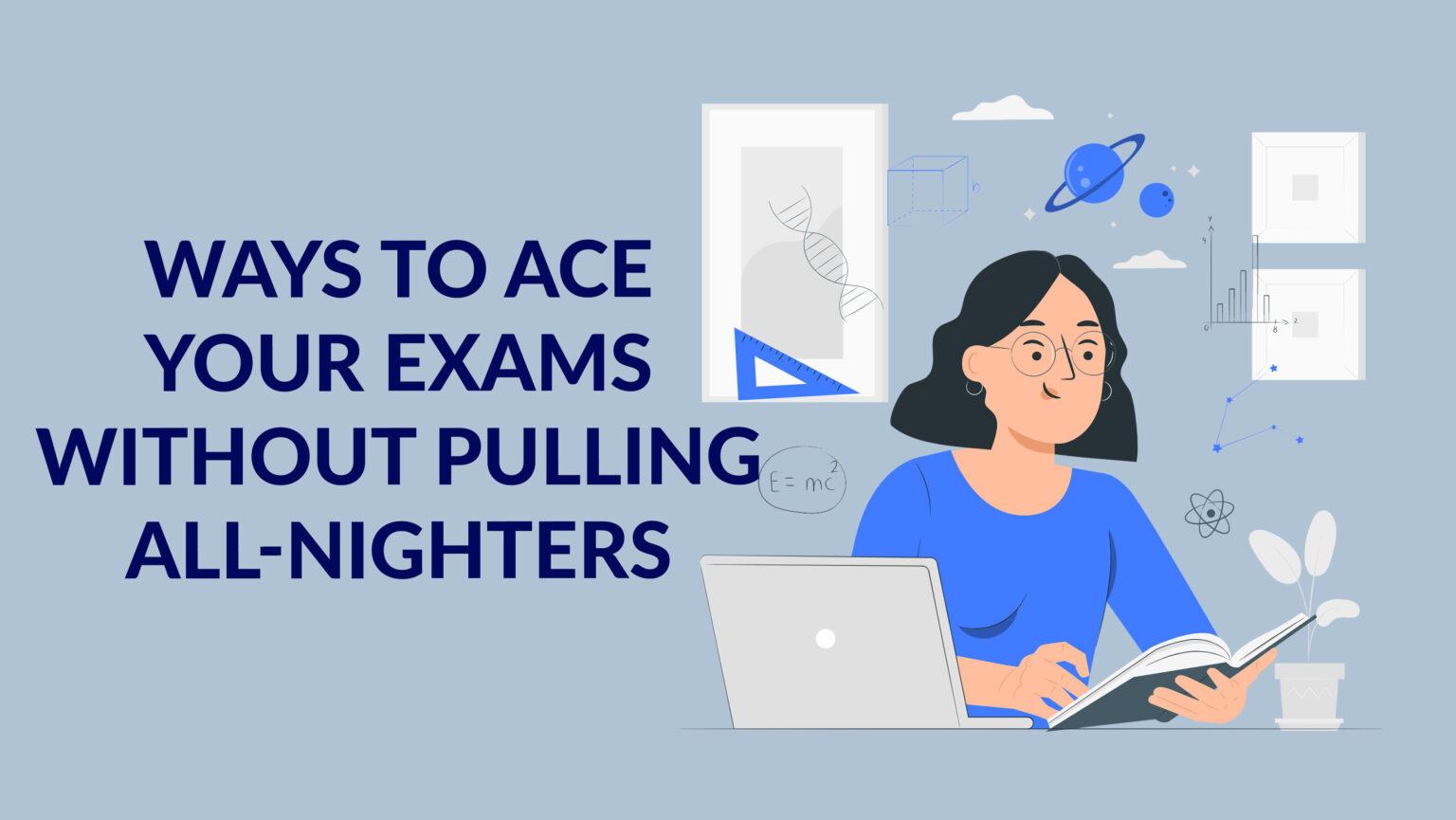Exams can be a stressful time for university students, with the pressure to perform at your best often leading to late nights spent studying.
However, pulling all-nighters is not the only way to succeed on exams. In fact, it can be more detrimental to your performance than helpful. In this blog post, we will be sharing five ways to ace your exams without sacrificing your sleep.
By implementing these strategies, you can improve your focus, retention, and overall exam performance, all while getting a good night’s rest.
So, put down the energy drinks and get ready to learn some new study techniques that will help you succeed on your exams without the need for all-nighters.
Table of Contents
1- Create a Study Schedule and Stick to It
One of the most effective ways to ace your exams without pulling all-nighters is to create a study schedule and stick to it.
This will help you break up your studying into smaller, more manageable chunks, rather than trying to cram all of your studying into one or two late nights.
Start by making a list of all the exams you have coming up and the subjects you need to study for each one. Then, look at your schedule and figure out when you have free time to dedicate to studying.
It can be helpful to schedule your study sessions at the same time each day, as this will help establish a routine and make it easier for you to focus.
Once you have your study schedule mapped out, make sure to stick to it as closely as possible. It can be tempting to push your studying off until later, but this can lead to last-minute cramming and ultimately reduce your chances of success on your exams.
By staying on track with your study schedule, you’ll be able to get a better handle on the material and feel more confident going into your exams.
2- Use Active Learning Techniques to Retain Information
If you’re tired of the old “read, re-read, repeat” study method, it might be time to try out some active learning techniques.
These techniques involve actively engaging with the material you’re trying to learn, rather than just passively reading or listening to it.
Not only are active learning techniques more fun, but they’re also more effective at helping you retain information. So, ditch the highlight markers and try out some of these techniques instead:
- Teach the material to someone else. This could be a study partner, a friend, or even just a stuffed animal. The act of explaining the material to someone else will not only help you better understand it, but it will also force you to think critically about the information and organize it in a way that makes sense.
- Create concept maps or diagrams. Visual learners, this one’s for you! By creating a visual representation of the material, you can better understand the relationships between different concepts and retain the information more effectively.
- Write about the material. Whether it’s through a traditional essay or just a list of notes, the act of writing about the material can help you process and retain it more effectively.
So, the next time you sit down to study, try out some of these active learning techniques and see if they help boost your retention. Your brain (and probably your study partner) will thank you.
3- Find a Study Environment That Works for You
We’ve all been there: you sit down to study in the library, only to be interrupted every five minutes by the sound of someone’s phone ringing, someone loudly talking on the phone, or someone’s computer playing a loud video.
Or, maybe you try to study in your room, only to be constantly distracted by notifications on your phone or the temptation to watch just one more episode of your favorite show.
The point is, finding a study environment that works for you is crucial to acing your exams without pulling all-nighters. So, it’s time to get picky about where you study. Here are a few tips for finding the perfect study spot:
- Experiment with different locations. Don’t be afraid to try out different study spots on campus or off campus. You might find that you work best in a quiet corner of the library, in a coffee shop with a bit of background noise, or even outside on a park bench.
- Consider the time of day. Are you a morning person or a night owl? Experiment with studying at different times of the day to see when you’re most productive.
- Make sure you have the resources you need. If you need access to certain books or other materials, make sure your study spot has them available.
By finding a study environment that works for you, you’ll be able to focus more effectively and get more out of your study sessions. So, don’t be afraid to get picky and find the perfect spot to help you ace those exams.
4- Break Up Your Studying into Smaller, More Manageable Chunks
One of the biggest mistakes students make when preparing for exams is trying to cram all of their studying into one or two long sessions.
Not only is this overwhelming and exhausting, but it’s also less effective at helping you retain the information. Instead, try breaking up your studying into smaller, more manageable chunks. This can help reduce anxiety and make the material easier to understand and remember.
To do this, you can create a study schedule (as mentioned in the first subheading) and block off specific times each day to focus on different subjects or topics.
You can also try the Pomodoro Technique, which involves working for 25 minutes and then taking a 5-minute break, and repeating this process until you’ve completed your study session.
5- Get Enough Sleep and Practice Good Sleep Hygiene
As tempting as it might be to sacrifice sleep for extra study time, getting enough sleep is crucial for acing your exams.
When you’re sleep-deprived, your brain has a harder time retaining and processing information, which can negatively impact your exam performance.
In fact, research has shown that getting a good night’s sleep can actually help improve memory consolidation and cognitive function.
To get enough sleep, it’s important to practice good sleep hygiene. This includes establishing a consistent sleep schedule, creating a relaxing bedtime routine, and creating a sleep-friendly environment (e.g., keeping the room dark, quiet, and at a comfortable temperature).
It’s also a good idea to avoid screens (e.g., phones, laptops, TVs) for at least an hour before bed, as the blue light emitted by these devices can disrupt your body’s natural sleep patterns.
Conclusion
So we covered the most effective ways to ace your exams without pulling all-nighters. By creating a study schedule and sticking to it, you can break up your studying into more manageable chunks and avoid the temptation to cram all of your studying into one or two late nights.
Using active learning techniques can also help boost your retention and make studying more enjoyable. Finding a study environment that works for you can help you stay focused and avoid distractions.
And, of course, getting enough sleep and practicing good sleep hygiene are crucial for maintaining cognitive function and improving memory consolidation.
Remember, these strategies are just the beginning. Experiment with different techniques and find what works best for you. With a little bit of planning and some effective study habits, you can succeed on your exams without sacrificing your sleep. Good luck!




